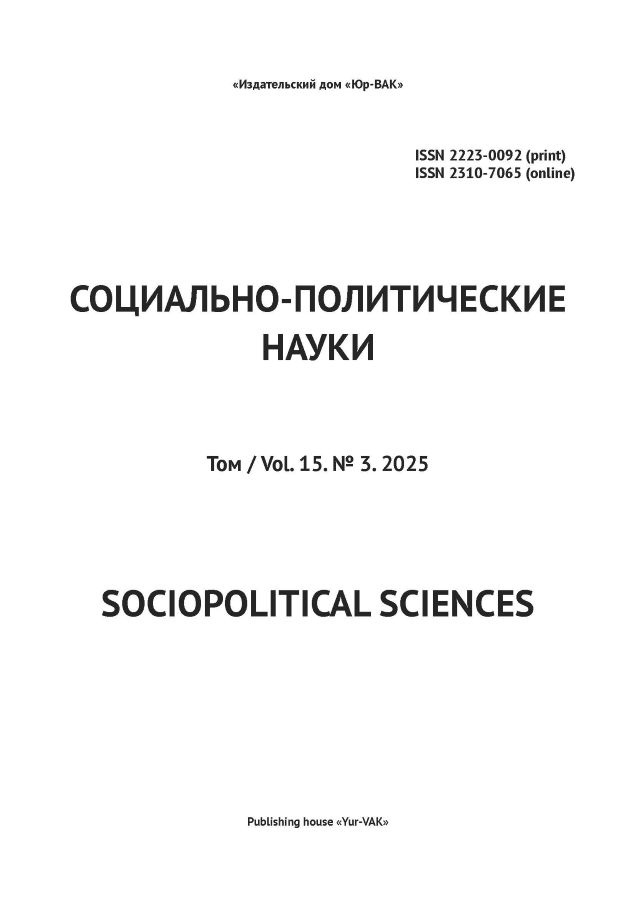Energy Policy of the United Arab Emirates: Determining Factors, Principles and Model
- 作者: Dubrovina O.V.1, Nesterchuk O.A.1,2, Plotnikov V.S.3, Grishin O.E.2
-
隶属关系:
- Russian Academy of National Economy and Public Administration under the President of the Russian Federation
- Patrice Lumumba Peoples’ Friendship University of Russia
- Siberian State Transport University
- 期: 卷 15, 编号 3 (2025)
- 页面: 66-71
- 栏目: Public Administration and Sectoral Policies
- URL: https://journals.eco-vector.com/2223-0092/article/view/687841
- DOI: https://doi.org/10.33693/2223-0092-2025-15-3-66-71
- EDN: https://elibrary.ru/RSWAGM
- ID: 687841
如何引用文章
详细
Purpose of the study. The article is devoted to the problem of forming the energy policy of the United Arab Emirates. The main factors of the state energy policy influencing the development of the country, its principles and models are analyzed. Attention is focused on the theories of “old” and “new” regionalism, such as the theory of dividing the international space into regions. Within the framework of the theory of “new” regionalism, an intergovernmental approach (Inter governmentalism) is used. The example of the United Arab Emirates shows the strategy and need for the formation of energy policy, building its model considering the energy situation developing in the modern world, considering interaction with global and regional powers. The state energy policy is based on the principles of pragmatism and “equidistance” in relations with countries exporting and importing energy resources. Conclusions. As a result of the study, the authors concluded that the United Arab Emirates advocate an integrative and multi-faceted development process in the context of implementing its state energy policy. Today, there are two models of such a policy. The first model is traditional (export-oriented), the second model is alternative. The geopolitical vector of the energy policy of the United Arab Emirates is built in the context of globalization, the growth of international competition for energy resources, the lability of world energy markets and the volatility of oil prices. There is a need to diversify and strengthen the country’s export potential, to move from the “geopolitics of oil” to the “geopolitics of gas”.
全文:
作者简介
Olga Dubrovina
Russian Academy of National Economy and Public Administration under the President of the Russian Federation
编辑信件的主要联系方式.
Email: dubrovinaov@list.ru
ORCID iD: 0000-0002-9096-0253
SPIN 代码: 4901-9009
Scopus 作者 ID: 57193953060
Dr. Sci. (Polit.); Professor at the Department of Political Science and Political Management
俄罗斯联邦, MoscowOlga Nesterchuk
Russian Academy of National Economy and Public Administration under the President of the Russian Federation; Patrice Lumumba Peoples’ Friendship University of Russia
Email: nesterchuk68@mail.ru
ORCID iD: 0000-0002-8776-2694
SPIN 代码: 9007-5888
Scopus 作者 ID: 56669828000
Dr. Sci. (Polit.); Professor at the Department of Political Science and Political Management; Professor at the Department of Public Policy and History of State and Law
俄罗斯联邦, Moscow; MoscowVasily Plotnikov
Siberian State Transport University
Email: vasili.73@mail.ru
ORCID iD: 0000-0003-0380-1463
SPIN 代码: 8387-4106
Cand. Sci. (Sociol.); Associate Professor at the Department of Customs Affairs
俄罗斯联邦, NovosibirskOleg Grishin
Patrice Lumumba Peoples’ Friendship University of Russia
Email: grishin_oe@pfur.ru
ORCID iD: 0000-0002-0669-1012
SPIN 代码: 1572-4533
Scopus 作者 ID: 57205197487
Researcher ID: A-9309-2017
Cand. Sci. (Polit.); Associate Professor at the Department of Public Policy and History of State and Law
俄罗斯联邦, Moscow参考
- Dubrovina O.V., Plotnikov V.S. Russia’s geopolitical orientation to the East. Dialogue partnership with ASEAN. Issues of Political Science. 2023. Vol. 13. No. 9-1 (97-1). Pp. 4445–4452. (In Rus.)
- Dubrovina O.V., Plotnikov V.S. Russia – Saudi Arabia: Foreign policy pivot to the East. Issues of National and Federal Relations. Issue 7 (112). 2024. Vol. 14. Pp. 2360–2368. (In Rus.)
- Mastepanov A.M., Sumin A.M. Energy policy of the Persian Gulf Monarchies on the eve of the energy transition. Energy Policy. 2021. No. 1 (155). Pp. 56–77. (In Rus.) doi: 10.46920/2409-5516-2021-1155-56.
- Anokhin M.G., Grishin O.E. Energy safety: Politics and diplomacy. Przeglad Strategiczny. 2013. Vol. 1. Pp. 155–163.
- Fawcett L. Regionalism from historical perspective. In: Global politics of regionalism: Theory and practice. M. Fareell, B. Hettne, L. Langenhove (eds.). L., 2005. P. 430.
- Hoffmann S. Obstinate or obsolete? The fate of the nation-state and the case of Western Europe. Daedalus. 1966. No. 95/3.
- Hooghe L., Marks G.A. Postfunctionalist theory of European integration: From permissive consensus to constraining dissensus. British J. of Political Science. 2009. No. 39/1. Рp. 865–921.
- Krane J. “The politics of reform”. Energy Kingdoms: Oil and political survival in the Persian Gulf. Columbia University Press, 2019, Рp. 136–159.
补充文件








